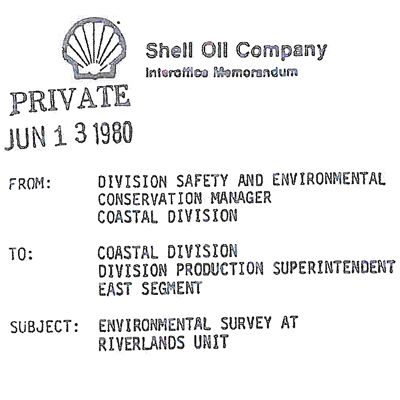Secret Oil Company Memos on Pollution in Louisiana
“All of these practices are flagrant violations of the law.”
By Ken Silverstein ( October 11, 2013 )

In March, I traveled to Louisiana to report on the “legacy lawsuits” being launched by landowners against the state’s energy corporations, which have been drilling there since 1901. For decades, companies like BP, ExxonMobil, and Shell leased sites from the landowners for extraction and processing. This went on until the 1980s, when the companies began selling off their interests to independent producers and moved their operations largely offshore. They left behind land contaminated with oil, petrochemicals, and other toxic substances.
One of the most frequently cited environmental hazards in the suits is a byproduct of the drilling process that the oil companies benevolently label “brine” (or “produced water”). This waste fluid is highly saturated with salt, and where it is improperly stored, it endangers groundwater and vegetation. Brine has been found to contain traces of benzene, chromium, lead, and other potential carcinogens, as well as radioactive materials. American oil companies once stored brine in unsealed open pits, despite their awareness that the practice was unsafe. In 1932, V. L. Martin of the American Petroleum Institute told his colleagues that brine would undoubtedly seep from the pits and cause significant environmental damage. It was, Martin said, “only a question of time until the opposition to the escape of our waste will become strong enough to force us, as an economical measure, to dispose of them in such a manner as will not be objectionable.”
Around that time, industry developed a method of injecting waste in saltwater disposal wells, a safer practice than pit disposal, and one that soon became the primary method. Some states banned unlined pits, but in Louisiana companies continued to store brine in them until the 1980s (and even then, state regulators, who were often oilmen themselves, allowed a three-year grace period for shutting down the pits).
Louisiana landowners began winning big payouts from oil corporations in 2003, when the state Supreme Court upheld a $33 million jury judgment against Shell in a case brought by a man named William Corbello. Hundreds of others have filed suit since then, prompting energy companies to launch a massive and generally successful lobbying campaign aimed at getting Louisiana’s perennially pro-oil legislature to restrict the suits. The plaintiffs’ trial lawyers have won access through the discovery process to a historic trove of internal oil-company memos, which, as I detail in “Dirty South,” (Harper’s, November), show that the companies long understood the environmental dangers of unlined pits but continued to use them — sometimes in defiance of state and federal regulations — because doing so was more profitable than phasing out the pits.
in full: http://harpers.org/blog/2013/10/secret-oil-company-memos-on-pollution-in-louisiana/
